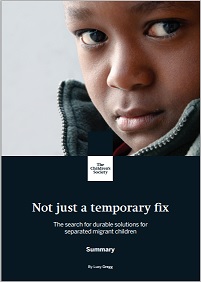New report finds consideration of the long-term needs of separated migrant children in the UK is often forgotten
Vulnerable migrant children are being left in legal limbo, the Children's Society said in a report published last week.
 You can read the report, Not Just a Temporary Fix: The search for durable solutions for separated migrant children, here.
You can read the report, Not Just a Temporary Fix: The search for durable solutions for separated migrant children, here.
The report looks at the experiences of separated migrant children in the UK and finds that consideration of their long-term needs is often forgotten about or avoided altogether.
"These children face exceptionally difficult circumstances and lack the care of parents and family, increasing their vulnerability to exploitation and abuse, creating a unique and complex set of needs. Many of these children require support and care from the immigration and welfare systems in this country," the report notes.
The report "finds that, for a sizeable number of these children, no clear resolution to their situation is considered, and when they reach adulthood they face a process which can leave them in a legal limbo, without support and facing destitution. The Home Office is eager to return these young people to their countries of origin as part of its function to control migration. While it is important to make sure that children are united with their families when and where it is safe, the current policies and processes do not allow for this to happen systematically in a way that is consistent with children's best interests."
The Children's Society says children face an ad hoc system to determine what will happen to them as they approach adulthood, based on their immigration status rather than their needs, violating the Government's commitment under the UN Convention on the Rights of the Child to prioritise children's welfare.
The report says that the Government needs to develop policies that provide lasting solutions for these children, not just ones that focus on their short-term needs.
It recommends that Home Office decision-makers should be trained on how to assess a separated child's best interests, and says that all agencies involved in the lives of such children need to work together to make sure their best interests are always at the heart of any decisions taken about them.
In addition, the report recommends that the Home Office should conduct independent research into the return process for former separated children to their countries of origin, to determine if this approach can be deemed to be in their best interests and if it represents a durable solution.
Matthew Reed, Chief Executive of The Children's Society said: "This group of children is among the most vulnerable in the country, yet they are left with no sense of what will happen to them as they reach the brink of adulthood. It is crucial that the Government helps children who are in the UK on their own over the long-term. The authorities need to make sure children have the stability necessary so they can develop, thrive, and have the best possible chance in life."